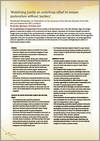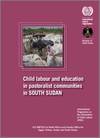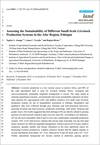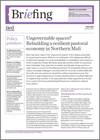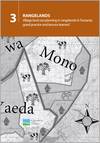The real measure of success in the work that FAO does, is how effectively they help the most needy to live free of hunger, in better health and with stronger livelihoods. In 2013, FAO worked in north-eastern Uganda to explore how the concept of One Health can be implemented at the community level. This video highlights the work that the FAO team together with villagers, district health, agriculture and wildlife officials, and national decision-makers did to improve delivery of health services for pastoralists and their livestock. They identified brucellosis, a bacterial disease causing human suffering and livestock production losses, and took steps to assist in preventing this disease. Most importantly, the video shows how One Health teams can listen carefully to community members, both in setting health priorities and determining the best ways to help the community to improve their lives and livelihoods.
Year of publication: 2013Organization: Food and Agriculture Organization of the United Nations (FAO)
Topic: Food security, Healthcare, Resilience
Language: English
Type of document: Videos
Geographical coverage: Eastern Africa
This report highlights the importance of pastoralist livestock mobility for the resilience of pastoralist livelihood systems and for maximising productivity. Tufts and partners monitored camel, sheep and cattle herds for up to five months in Darfur and Kordofan regions of Sudan. Using mixed methods and GPS tracking the study recorded in detail herd movements and management strategies in response to environmental parameters (the advancing rains and greening up of vegetation). The study highlights a diverse range of modernising trends and livelihood adaptations, including for example diversified investment strategies, herder responses to inter-tribal conflict in East Darfur and conflict avoidance strategies. Local case-studies present new evidence of a distinctive pastoralist approach to natural resource management that regulates access to natural resources rather than seeking to control numbers of animals. Not all trends are positive, and thus need to be analysed so as to support the positive while mitigating potential negative consequences.
A Policy Brief of the report can be found here.
Year of publication: 2013Organization: Feinstein International Center
Topic: Conflict, Economy, Environmental services, Food security
Language: English
Type of document: Policies and legislation
Geographical coverage: Eastern Africa
The representatives of the governments of the six countries of the Sahel (Burkina Faso, Chad, Mali, Mauritania, Niger, and Senegal) gathered in Nouakchott by invitation of the Government of the Islamic Republic of Mauritania, the Permanent Interstate Committee for Drought Control in the Sahel (CILSS), and the World Bank in collaboration with the African Union Commission, the Economic Community of West African States (ECOWAS), the West African Economic and Monetary Union (WAEMU), and the United Nations Food and Agriculture Organization (FAO) and in the presence of representatives of international and regional research organizations, civil society organizations, producers' organizations, the private sector, and technical and financial partners, for the purpose of strengthening the resilience of Sahelo-Saharan pastoral societies.
Year of publication: 2013Organization: Individual authors
Topic: Participation
Language: English
Type of document: Policies and legislation
Geographical coverage: West Africa, Central Africa
This study gives an in–depth understanding of child labour in selected pastoralist communities in South Sudan. This information can be used to formulate and/or revise public policies and programmes on education and child labour elimination.
Year of publication: 2013Organization: International Labour Organization (ILO)
Topic: Gender and youth
Language: English
Type of document: Technical
Geographical coverage: Eastern Africa
Livestock production is a key income source in eastern Africa, and 80% of the total agricultural land is used for livestock herding. Hence, ecological and socio-economically sustainable rangeland management is crucial. This study aimed at selecting operational economic, environmental and social sustainability indicators for three main pastoral (P), agro-pastoral (AP), and landless intensive (LI) small-scale livestock production systems for use in sustainability assessment in Ethiopia. The study concluded that sustainability indicators are valuable tools to highlight shortcomings and strengths of the three main livestock production systems and help with future livestock management in Ethiopia. Selecting suitable indicators, however, is crucial as data requirements and availability can vary across livestock systems
Year of publication: 2013Organization: Individual authors
Topic: Food security, Resilience
Language: English
Type of document: Technical
Geographical coverage: Eastern Africa
Much has been made of the ‘ungoverned spaces’ of the Sahara, impossible for government to police. While it is true that parts of the Sahara are difficult to patrol and manage, it is not all uninhabitable or uninhabited: some areas are home to pastoral nomads. But these areas also provide shelter for a growing band of jihadists. They share the mountains and Sahelian fringes and are a major cause of concern for the Mali government. To limit jihadist influence will require immediate strategies: concerted effort to reconcile southern Mali with the north, and new policies to rebuild the northern pastoral economy. This should be a regional approach, to include rebuilding links to southern Mali and to neighbouring countries. A stronger pastoral society, supported by a border force could control the potential jihadist threat and contribute to national reconciliation.
Year of publication: 2013Organization: International Institute for Environment and Development (IIED)
Topic: Conflict, Land
Language: English
Type of document: Technical, Policies and legislation
Geographical coverage: West Africa
Pastoralists require movement across village boundaries to access or share grazing or water resources. They may classify and use land in ways that do not fit easily with government definitions or processes. Grazing is often patchily distributed, and large areas of rangeland with flexible use are required. Pastoralism is an integrated and multiple-use land use systems, which rely upon collective use and management of natural resources by customary institutions. This makes village land use planning (VLUP) processes in rangelands contexts quite challenging.
This document, developed by the Sustainable Rangeland Management Project (SRMP), seeks to suggest improvements to the VLUP process in order to better contribute to sustainable rangeland management. It brings together experience from different organisations and government departments working on VLUP in rangelands areas of Tanzania, as well as relevant lessons from other contexts.
Year of publication: 2013Organization: International Land Coalition (ILC)
Topic: Indigenous knowledge, Indigenous peoples, Land, Organization, Participation
Language: English
Type of document: Technical
Geographical coverage: Eastern Africa
This report documents the findings of a livelihoods assessment carried out as part of the USAID funded Growth, Health and Governance program being implemented by Mercy Corps and partners in the Karamoja sub-region of Northeastern Uganda. The study set out to identify the major opportunities and constraints to production and marketing in the study area and to investigate what productive resources are currently available and how these are being utilized. The study included focus group discussions, participatory exercises, a number of visits to market centers as well as key informant interviews.
Year of publication: 2013Organization: Feinstein International Center, United States Agency for International Development (USAID)
Topic: Economy
Language: English
Type of document: Technical
Geographical coverage: Eastern Africa




